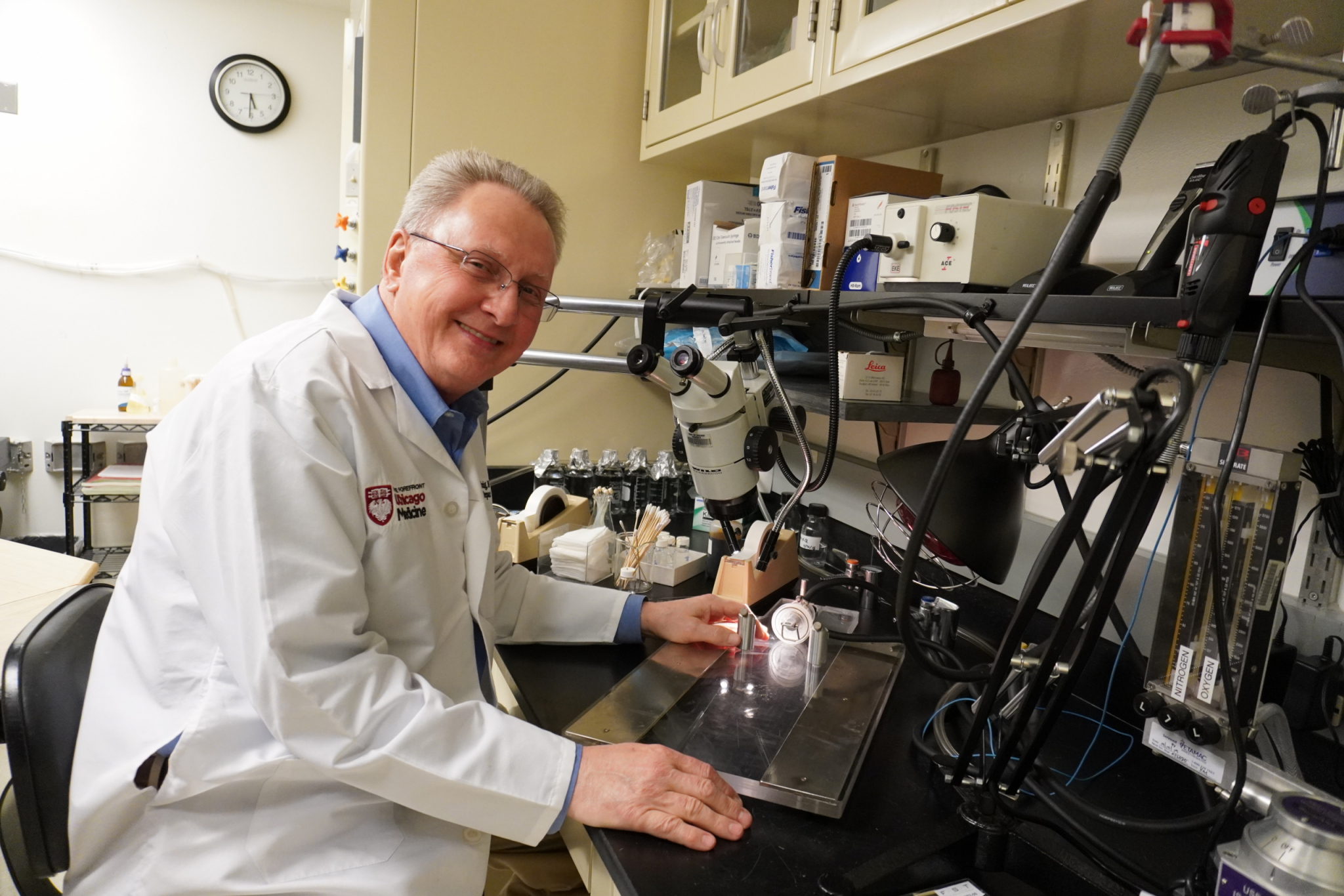February 12, 2020 I Jola Glotzer
Intranasal IGF-1 to treat headaches
Chicago Business Wire reports on promising results of research, supported in part through a CBC Director’s Fund Award to Richard Kraig, UChicago, showing that Insulin-like growth factor-1 (IGF-1) could be helpful in a treatment of headache
Richard Kraig of UChicago has recently published in Brain Research, an article titled “Insulin-like growth factor-1 inhibits spreading depression-induced trigeminal calcitonin gene related peptide, oxidative stress & neuronal activation in rat.” The research results described in the paper have been partially attributed to a CBC Director’s Fund Award.
Kraig is the William D. Mabie Professor in the Neurosciences at UChicago. He received a CBC Director’s Fund Award in 2019 for the project titled “Development of Fluorine-labelled IGF-1 Probes for Future Imaging in vivo.” The project was successfully completed in mid-2019 with a premise that the probes will be used in the future studies in vivo to investigate nose-to-brain delivery of insulin-like growth factor-1 (IGF-1) as a migraine treatment. The overarching aim of the studies is to develop a new line of anti-migraine therapeutics, now in the hands of a UChicago spinoff company, Seurat Therapeutics, in collaboration with Kraig who serves as CSO of Seurat. The Brain Research study is a summary of the preclinical studies of IGF-1 intranasal applications in a rat migraine model system.
The CBC Director’s Fund Award program was established in late 2018 as a corollary of the CBC Accelerator Award program. The Director’s Fund became a vehicle through which experiments, designed in collaboration with the CBC Executive Director who provided drug discovery/development expertise, could be efficiently funded to address one or more weakness, strengthening the project for future funding through CBC or other award/granting agencies. To date, eight Director’s Fund Awards have been made.
To learn more about Seurat and Kraig’s work enjoy reading the article recently published in Chicago Business Wire, reposted below.
February 10, 2020 | Mariah Montenegro | Chicago Business Wire
Seurat Therapeutics Announces Novel Mechanisms from Rat Migraine Model of Intranasal Insulin-like Growth Factor-1
CHICAGO–(BUSINESS WIRE)–Seurat Therapeutics, Inc. (Seurat) announced today the publication of preclinical studies of its lead product candidate, intranasal insulin-like growth factor-1 (IGF-1), in a rat model of migraine headaches, in the scientific journal Brain Research. The studies were conducted in Dr. Richard Kraig’s laboratory at the University of Chicago. Seurat is the world-wide licensee of patents for nasal IGF-1 treatment of migraine headaches from the University of Chicago.
The publication reports that trigeminal pain pathway activation is significantly reduced after intranasal IGF-1 treatment. The studies demonstrated that oxidative stress increases calcitonin gene-related peptide (CGRP) expression, a trigeminal system pain pathway mediator associated with migraine; and that intranasal IGF-1 significantly reduces oxidative stress levels and trigeminal ganglion CGRP. This beneficial effect was not associated with hypoglycemia, which can occur with systemic administration of IGF-1. These findings support that intranasal IGF-1 has a unique potential to safely prevent migraine headaches through multiple novel mechanisms. “Further studies and clinical trials will be needed to validate this observation in humans, but we are enthusiastic about the results,” said Yuan Zhang, Ph.D., M.S., CEO of Seurat.
“IGF-1’s therapeutic effects involve reducing oxidative stress and the amount of CGRP, which are known to be involved in human migraine headaches. This suggests that IGF-1 alone or in combination with other ant-CGRP agents may provide better migraine relief, something we are actively testing in the lab,” said Richard Kraig, M.D., Ph.D., the William D. Mabie Professor in the Neurosciences at The University of Chicago and CSO of Seurat.
“If continued testing demonstrates that nasal delivery of IGF-1 is safe and effective for treatment of migraine headaches in humans, Seurat has the potential of helping approximately 39 million migraine sufferers in the United States,” said Martin Sanders, MD, Chairman of Seurat.
The studies were supported with funding from Seurat, the National Institute of Neurologic Diseases and Stroke, the University of Chicago’s Institute for Translational Medicine, Polsky Center’s George Schultz Innovation Fund, Booth School of Business’s Edward L. Kaplan, ’71, New Venture Challenge, the Chicago Biomedical Consortium, and CuresWithinReach.
About Seurat Therapeutics, Inc
Seurat therapeutics is a preclinical biotech startup spun out of research conducted at the University of Chicago and based in the Polsky Exchange in Chicago, IL. Seurat is developing a nasal spray to alleviate and prevent future migraines. This treatment addresses the cause of migraines, as opposed to only symptom management, by utilizing a native biological protein, as shown in animal models, to prevent the onset of migraines, repair damaged brain cells, and reduce brain disease. It is predicted that this therapy could be applied as a treatment for other neurodegenerative diseases, such as Alzheimer’s, due to its neurogenerative properties
About the Polsky Center
Polsky Center for Entrepreneurship and Innovation at the University of Chicago brings the power of ideas in the laboratory, classroom and community to the world by providing resources to commercialize discoveries, partner with companies, and attract venture capital. The Polsky Center helps foster a culture of innovation that extends across the University, city and region, including UChicago’s nationally-recognized accelerator program, the Edward L. Kaplan, ’71, New Venture Challenge. The mission of the Polsky Center is to bridge the gap between knowledge and practice, idea and action, and research and impact.
Publication attributed to the CBC funding:
Won L, Kraig RP. Insulin-like growth factor-1 inhibits spreading depression-induced trigeminal calcitonin gene related peptide, oxidative stress & neuronal activation in rat. Brain Res. 2020 Jan 21;1732:146673. [Epub ahead of print] (PubMed)
SOURCE:
Adapted (with modifications) from Chicago Business Wire, by Mariah Montenegro, published on February 10, 2020.

